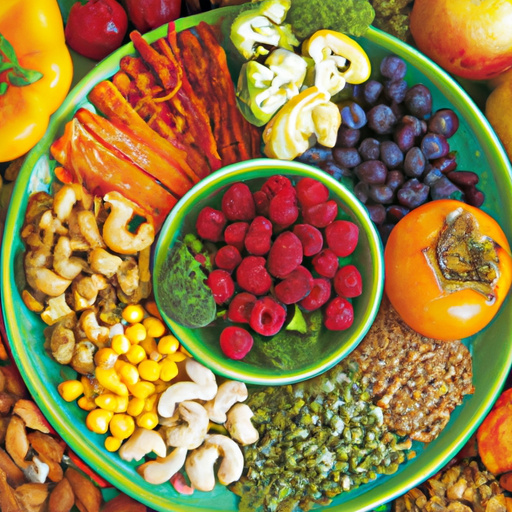Immerse yourself in the world of plant-based diets and unlock the numerous benefits they offer with Tastepan’s comprehensive guide. From mouthwatering recipes that prioritize your well-being to expert advice on incorporating nutritious meals into your everyday life, this guide empowers you to nourish your body without compromising on taste. With Tastepan as your trusted source, embark on a journey towards a healthier lifestyle that leaves you feeling satisfied and energized. So, let’s dive into the exciting realm of plant-based diets and discover a world of culinary delights that are as good for you as they are delicious.

1. Introduction to Plant-Based Diets
1.1 What is a Plant-Based Diet?
A plant-based diet is a dietary approach that primarily focuses on foods derived from plants, such as fruits, vegetables, whole grains, legumes, nuts, and seeds. While there are variations within plant-based diets, the common element is the emphasis on plant foods as the foundation of the meal. Animal products, including meat, poultry, fish, dairy, and eggs, may be consumed in smaller quantities or eliminated altogether.
1.2 History of Plant-Based Diets
The concept of plant-based diets can be traced back centuries in various cultures and religious traditions. Jainism, Buddhism, and Hinduism, for example, advocate for plant-based eating as a means of reducing harm to living beings. In the modern era, plant-based diets gained increased attention in the 20th century, with publications like “Diet for a Small Planet” by Frances Moore Lappé, which highlighted the environmental and ethical benefits of plant-based eating. Today, plant-based diets have gained mainstream popularity as a result of growing concerns about health, sustainability, and animal welfare.
2. Health Benefits of Plant-Based Diets
2.1 Lower Risk of Chronic Diseases
One of the key health benefits associated with plant-based diets is a reduced risk of chronic diseases. Research has consistently shown that plant-based diets, rich in fruits, vegetables, and whole grains, are associated with a lower incidence of conditions such as heart disease, type 2 diabetes, obesity, and certain types of cancer. The high fiber content and abundance of phytochemicals found in plant foods contribute to these protective effects.
2.2 Weight Management
Maintaining a healthy weight is important for overall well-being, and plant-based diets can be beneficial in achieving and maintaining weight loss. Plant-based foods tend to be lower in calories and higher in fiber compared to animal products. This combination helps to promote feelings of fullness, reduce overeating, and control calorie intake. Additionally, the consumption of whole, nutrient-dense plant foods can support healthy weight management by providing essential vitamins, minerals, and antioxidants.
2.3 Improved Heart Health
Plant-based diets have been shown to have a positive impact on cardiovascular health. By reducing or eliminating the consumption of saturated and trans fats found in animal products, individuals following plant-based diets can lower their cholesterol levels and blood pressure. The abundance of heart-healthy nutrients, such as fiber, potassium, and antioxidants, found in plant foods further supports heart health. Studies have demonstrated that adhering to a plant-based diet can significantly reduce the risk of developing cardiovascular diseases, including heart attacks and strokes.
2.4 Reduced Inflammation
Chronic inflammation is a common underlying factor in many health conditions, including autoimmune diseases, diabetes, and certain cancers. Plant-based diets, which are rich in anti-inflammatory foods like fruits, vegetables, nuts, and seeds, can help reduce inflammation in the body. The antioxidants and phytochemicals present in these plant foods have been shown to combat oxidative stress and modulate inflammatory pathways, leading to a decreased risk of chronic inflammation.
2.5 Enhanced Digestion
The fiber content in plant-based diets plays a crucial role in maintaining a healthy digestive system. Adequate fiber intake promotes regular bowel movements, prevents constipation, and supports overall gut health. Plant foods contain both soluble and insoluble fiber, which help to regulate digestion, promote the growth of beneficial gut bacteria, and prevent gastrointestinal disorders. Additionally, the natural enzymes present in many plant-based foods aid in effective digestion and nutrient absorption.
2.6 Increased Nutrient Intake
Adopting a plant-based diet can lead to a higher intake of essential nutrients and micronutrients. Plant foods are naturally rich in vitamins, minerals, and antioxidants, which are vital for optimal health. Fruits and vegetables, in particular, provide a wide array of vitamins (such as vitamin C and vitamin A) and minerals (such as potassium, magnesium, and folate) that are essential for various bodily functions. By incorporating a diverse range of plant-based foods into your diet, you can ensure you’re getting a wide spectrum of nutrients to support your overall health.

3. Environmental Benefits of Plant-Based Diets
3.1 Reduced Greenhouse Gas Emissions
Plant-based diets have a significantly lower environmental footprint compared to diets heavy in animal products. The production of meat, especially beef and lamb, contributes significant greenhouse gas emissions, including methane and carbon dioxide, which are major drivers of climate change. By reducing or eliminating meat consumption, individuals can significantly reduce their carbon footprint and contribute to mitigating climate change.
3.2 Preservation of Natural Resources
Animal agriculture requires vast amounts of land, water, and energy compared to the cultivation of plant-based foods. Livestock farming consumes large quantities of water for animal hydration and crop irrigation, contributes to deforestation for pastureland, and requires substantial energy for processes such as feed production and transportation. By shifting towards plant-based diets, we can alleviate the strain on natural resources and help promote sustainable land use practices.
3.3 Decreased Water Usage
Water scarcity is a pressing global issue, and the livestock industry is a major contributor to water depletion. Raising animals for food requires substantial amounts of water for drinking, cleaning, and the production of animal feed. In contrast, plant-based diets require significantly less water, as crops for human consumption are generally more efficient in terms of water usage. By adopting plant-based diets, we can conserve freshwater resources and contribute to water sustainability.
3.4 Prevention of Deforestation
The expansion of livestock farming is a leading cause of deforestation, particularly in regions like the Amazon rainforest. The need for grazing land and the cultivation of animal feed crops like soybeans contribute to widespread deforestation and habitat destruction. By reducing our consumption of animal products, we can help mitigate deforestation and protect biodiverse ecosystems that are vital for the planet’s health.
4. Ethical Considerations of Plant-Based Diets
4.1 Animal Welfare
For many individuals, the ethical treatment of animals is a significant motivator for adopting a plant-based diet. Animal agriculture often involves practices that raise concerns about animal welfare, such as confined spaces, overcrowding, and the use of hormones or antibiotics. By choosing plant-based options, individuals can actively support a more compassionate and humane approach to food production.
4.2 Minimization of Animal Cruelty
Plant-based diets help in minimizing animal cruelty by reducing the demand for animal products sourced from factory farms. Factory farming practices often subject animals to harsh conditions and treatments that prioritize high productivity and profit margins over animal well-being. By opting for plant-based alternatives, individuals take a stand against the inhumane treatment of animals and promote a more ethical and compassionate food system.
4.3 Ethical Treatment of Animals in Agriculture
While not all agricultural practices involving animals are inhumane, certain aspects like intensive confinement or the use of growth-promoting substances are concerning to many individuals. Plant-based diets create an avenue to encourage more ethical treatment of animals in agriculture by emphasizing sustainable and humane farming practices. Supporting farmers and companies that prioritize the well-being and natural behaviors of animals helps promote a more ethical food system.

5. Potential Drawbacks and Challenges of Plant-Based Diets
5.1 Nutritional Deficiencies
One potential drawback of plant-based diets is the risk of nutritional deficiencies if not properly planned. Certain nutrients, such as vitamin B12, iron, calcium, and omega-3 fatty acids, are primarily found in animal products. However, with careful attention to food choices and potential supplementation, individuals can adequately meet their nutrient needs on a plant-based diet. Consulting with a registered dietitian or nutritionist can provide the necessary guidance to ensure a well-balanced and nutritionally sound plant-based eating plan.
5.2 Planning and Preparation
Transitioning to a plant-based diet may require planning and preparation, especially in the beginning stages. It can be helpful to meal plan, create shopping lists, and explore new recipes to ensure a diverse and enjoyable eating experience. Some individuals may find it challenging to navigate unfamiliar ingredients or adapt to different cooking methods, but with time and practice, these hurdles can be overcome. There are also numerous resources, cookbooks, and online communities available to provide support and inspiration along the way.
5.3 Social and Cultural Factors
Adhering to a plant-based diet in social settings or within certain cultural contexts can present challenges. Family gatherings, restaurants, and special occasions may not always offer abundant plant-based options. However, with effective communication and planning, these situations can be navigated successfully. Engaging in open conversations with friends and family, offering to bring plant-based dishes to events, and exploring plant-based-friendly dining options can help ensure inclusiveness and maintain a social support system while adhering to a plant-based lifestyle.
6. How to Transition to a Plant-Based Diet
6.1 Gradual Approach
One way to transition to a plant-based diet is by taking a gradual approach. Start by incorporating more plant-based meals into your existing diet and gradually reduce your consumption of animal products. Experiment with different plant-based recipes and gradually familiarize yourself with new ingredients. By allowing yourself time to adjust and explore, you can make long-lasting and sustainable changes to your eating habits.
6.2 Seeking Professional Guidance
If you’re uncertain about how to adopt a plant-based diet or have specific health considerations, seeking professional guidance can be beneficial. Registered dietitians or nutritionists can provide personalized recommendations based on your unique nutritional needs. They can help ensure that you’re meeting key nutrient requirements and offer support in planning and optimizing your plant-based meals.
6.3 Finding Suitable Plant-Based Alternatives
Transitioning to a plant-based diet often involves finding suitable alternatives to traditional animal-based products. Fortunately, there are now a wide variety of plant-based alternatives available in grocery stores and online, including plant-based proteins, dairy alternatives, and egg substitutes. Experimenting with different brands and types of products can help you find options that suit your taste preferences and nutritional needs.
6.4 Meal Planning and Grocery Shopping Tips
Meal planning and grocery shopping can play a crucial role in successfully adopting a plant-based diet. Start by planning your meals for the week, taking into account your schedule and nutritional needs. Create a grocery list based on your planned meals to ensure you have all the necessary ingredients on hand. When shopping, focus on the perimeter of the store where fresh produce, whole grains, legumes, nuts, and seeds are usually located. Additionally, be mindful of food waste and try to incorporate leftovers into future meals to optimize resources and minimize waste.
7. Frequently Asked Questions about Plant-Based Diets
7.1 Can I Get Enough Protein on a Plant-Based Diet?
Yes, it is entirely possible to meet your protein needs on a plant-based diet. While animal products are considered a complete source of protein, plant-based protein sources such as legumes, tofu, tempeh, seitan, quinoa, and various other grains and vegetables can provide all the essential amino acids your body requires. By incorporating a variety of plant-based protein sources into your diet and ensuring adequate calorie intake, you can easily meet your protein needs.
7.2 What About Vitamin B12?
Vitamin B12 is primarily found in animal products, which can pose a challenge for those following a plant-based diet. It is essential to ensure adequate vitamin B12 intake through fortified foods, such as plant-based milks, breakfast cereals, and nutritional yeast, or by taking a B12 supplement. Regular blood tests to monitor your vitamin B12 levels can help determine the appropriate supplementation dosage.
7.3 Is a Plant-Based Diet Suitable for Children?
Yes, a well-planned and nutritionally balanced plant-based diet can be suitable for children. However, extra attention should be given to ensure adequate nutrient intake, especially vitamin B12, vitamin D, calcium, iron, and omega-3 fatty acids. Consultation with a pediatrician or registered dietitian who specializes in plant-based nutrition can help ensure that children are meeting their nutritional needs for optimal growth and development.
7.4 Can I Build Muscle on a Plant-Based Diet?
Absolutely! Plant-based diets can provide all the essential nutrients needed for muscle growth and development. Plant-based sources of protein such as legumes, tofu, tempeh, seitan, and certain grains offer high-quality protein that can support muscle building. Additionally, adequate calorie intake, proper training, and recovery strategies are crucial regardless of diet type. Many athletes and bodybuilders thrive on plant-based diets and achieve outstanding results.
8. Success Stories and Testimonials
8.1 Inspiring Stories of Health Transformation
There are countless inspiring stories of individuals who have experienced incredible health transformations through adopting a plant-based diet. From weight loss and improved energy levels to the reversal of chronic diseases and increased overall well-being, these personal experiences showcase the potential of plant-based eating for improving health outcomes. These success stories serve as a powerful source of motivation and encouragement for those considering or embarking on a plant-based journey.
8.2 Athletes Thriving on Plant-Based Diets
Plant-based diets have gained popularity among athletes in recent years due to their ability to support optimal performance and recovery. Numerous professional athletes, including ultra-endurance athletes, Olympic medalists, and bodybuilders, have adopted plant-based diets and achieved remarkable results. Their achievements serve as evidence that plant-based diets can indeed provide the necessary nutrients for athletic performance and prove that plant-powered athletes can excel in their respective sports.
9. Delicious Plant-Based Recipes
9.1 Breakfast Recipes
- Green smoothie bowl with spinach, banana, and berries topped with granola and coconut flakes
- Overnight oats made with almond milk, chia seeds, and a variety of toppings like fruits, nuts, and seeds
- Tofu scramble with sautéed vegetables and spices, served with whole grain toast
9.2 Lunch and Dinner Recipes
- Roasted vegetable quinoa salad with lemon tahini dressing
- Chickpea curry served with brown rice and a side of roasted broccoli
- Mushroom lentil burgers with avocado, lettuce, and tomato on a whole grain bun
9.3 Snack and Dessert Recipes
- Energy balls made with dates, nuts, and cacao powder
- Hummus with crudites, such as carrots, celery, and bell peppers
- Vegan chocolate avocado mousse made with ripe avocados, cocoa powder, and maple syrup
9.4 Plant-Based Meal Planning Ideas
- Mexican-inspired meal: black bean and vegetable burrito bowls with salsa, guacamole, and corn tortillas
- Asian-inspired meal: stir-fried tofu and mixed vegetables with ginger, garlic, and soy sauce, served over brown rice
- Mediterranean-inspired meal: chickpea and vegetable skewers with a lemon-herb quinoa salad and a side of hummus and pita bread
10. Conclusion
Plant-based diets offer a wide range of health benefits, including a reduced risk of chronic diseases, improved heart health, enhanced digestion, and increased nutrient intake. They also have significant environmental and ethical benefits by reducing greenhouse gas emissions, preserving natural resources, and promoting the ethical treatment of animals. While transitioning to a plant-based diet may pose initial challenges, with proper planning and guidance, it can be a sustainable and rewarding lifestyle choice. By incorporating delicious plant-based recipes and embracing the wealth of information available, you can embark on a plant-based journey that prioritizes your well-being while contributing to a healthier planet.

